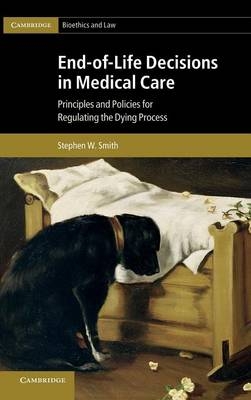
End-of-Life Decisions in Medical Care
Principles and Policies for Regulating the Dying Process
Seiten
2012
Cambridge University Press (Verlag)
978-1-107-00538-9 (ISBN)
Cambridge University Press (Verlag)
978-1-107-00538-9 (ISBN)
Decisions relating to assisted dying, euthanasia, palliative care and the withdrawal of treatment must take into account a range of issues. Stephen W. Smith outlines an ethical theory for end-of-life decisions and provides a critical examination of regulatory practices at the end of life.
Those involved in end-of-life decision making must take into account both legal and ethical issues. This book starts with a critical reflection of ethical principles including ideas such as moral status, the value of life, acts and omissions, harm, autonomy, dignity and paternalism. It then explores the practical difficulties of regulating end-of-life decisions, focusing on patients, healthcare professionals, the wider community and issues surrounding 'slippery slope' arguments. By evaluating the available empirical evidence, the author identifies preferred ways to regulate decisions and minimise abuses at the end of life, and outlines an ethical theory which can provide practical guidance for those engaged in end-of-life decisions.
Those involved in end-of-life decision making must take into account both legal and ethical issues. This book starts with a critical reflection of ethical principles including ideas such as moral status, the value of life, acts and omissions, harm, autonomy, dignity and paternalism. It then explores the practical difficulties of regulating end-of-life decisions, focusing on patients, healthcare professionals, the wider community and issues surrounding 'slippery slope' arguments. By evaluating the available empirical evidence, the author identifies preferred ways to regulate decisions and minimise abuses at the end of life, and outlines an ethical theory which can provide practical guidance for those engaged in end-of-life decisions.
Stephen W. Smith is a lecturer in law at Birmingham Law School, where he teaches bioethics, criminal law and medicine and jurisprudence.
1. Introduction; 2. Moral status; 3. The value of life; 4. Killing versus letting die and moral responsibility; 5. Autonomy and paternalism; 6. Beneficence, non-maleficence and harm; 7. Dignity; 8. A comprehensive ethical approach; 9. Introduction to Part Two; 10. Protection of patients; 11. The impact on health care practitioners; 12. Greater societal issues; 13. Slippery slope arguments; 14. Necessary procedural protections; 15. Conclusions.
| Reihe/Serie | Cambridge Bioethics and Law |
|---|---|
| Zusatzinfo | 4 Tables, black and white |
| Verlagsort | Cambridge |
| Sprache | englisch |
| Maße | 152 x 229 mm |
| Gewicht | 660 g |
| Themenwelt | Medizin / Pharmazie ► Medizinische Fachgebiete ► Medizinethik |
| Studium ► Querschnittsbereiche ► Geschichte / Ethik der Medizin | |
| Recht / Steuern ► EU / Internationales Recht | |
| Recht / Steuern ► Privatrecht / Bürgerliches Recht ► Medizinrecht | |
| Sozialwissenschaften ► Soziologie | |
| ISBN-10 | 1-107-00538-8 / 1107005388 |
| ISBN-13 | 978-1-107-00538-9 / 9781107005389 |
| Zustand | Neuware |
| Haben Sie eine Frage zum Produkt? |
Mehr entdecken
aus dem Bereich
aus dem Bereich
Die Geschichte eines Weltzentrums der Medizin von 1710 bis zur …
Buch | Softcover (2021)
Lehmanns Media (Verlag)
17,95 €
Krankheitslehren, Irrwege, Behandlungsformen
Buch | Softcover (2024)
C.H.Beck (Verlag)
39,95 €


